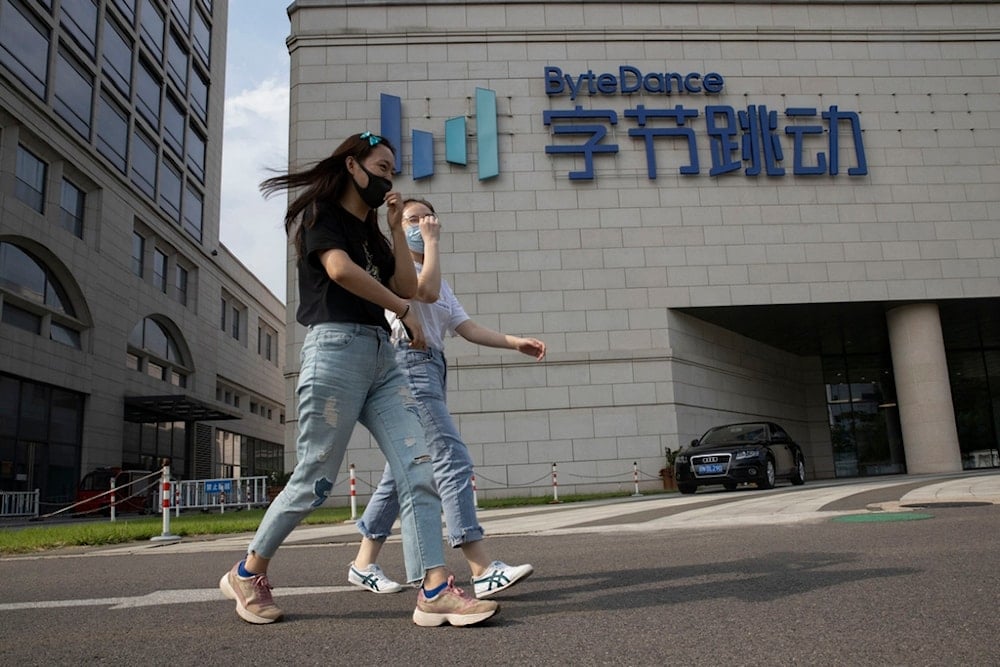ByteDance denies deal with Oracle as TikTok divestment deadline looms
ByteDance informed US officials that Beijing would not approve any deal unless broader trade tensions, particularly Trump's new round of tariffs on Chinese imports, were addressed.
-

Women wearing masks pass by the headquarters of ByteDance, the owner of TikTok, in Beijing, China, on August 7, 2020. (AP Photo/Ng Han Guan, File)
Chinese tech giant ByteDance has denied reports suggesting it has agreed to sell a controlling stake in TikTok to a US investor consortium led by Oracle. Chinese media on Tuesday cited company sources reaffirming that no agreement has been finalized, dismissing the claims as recycled rumors previously refuted in April.
This clarification comes amid mounting speculation over TikTok’s future in the US, where growing bipartisan concerns over national security and data privacy prompted the 2024 passage of the Protecting Americans from Foreign Adversary Controlled Applications Act. The law mandates that ByteDance divest TikTok’s US operations by January 19, 2025, or face a nationwide ban, extendable by three months if a sale is in progress.
The roots of the current impasse trace back to 2020 when ByteDance first proposed "Project Texas," a plan to route US user data through Oracle servers. Though initially welcomed, the project failed to satisfy escalating US demands, which by 2025 had shifted toward full American ownership of the platform.
Trump has revived efforts to orchestrate a sale. In January, Oracle reemerged as a leading bidder, backed by private equity firms aiming to establish a US-majority-owned TikTok entity. Other interested groups include one led by billionaire Frank McCourt and investor Kevin O'Leary. On June 29, Trump confirmed he would soon reveal the prospective buyers, calling them "very wealthy people."
Despite the momentum, ByteDance has reportedly informed US officials that Beijing would not approve any deal unless broader trade tensions, particularly Trump's new round of tariffs on Chinese imports, were addressed. On June 17, Trump extended TikTok's operating license through September 17, tying the reprieve to the formation of a new US-controlled company.
TikTok stalemate
Over the weekend, Trump announced he would begin talks with Chinese leadership early this week, on Monday or Tuesday, potentially with President Xi Jinping or a top envoy, to finalize the TikTok deal. "We pretty much have a deal," he said aboard Air Force One, adding that any agreement would still require Chinese government approval.
However, the Chinese government has signaled its red lines. Last week, the New York Times reported that Chinese regulators were deliberately stalling the approval process to maximize leverage in tariff negotiations with Washington. Beijing has also made clear that the transfer of TikTok's algorithm, classified as dual-use technology, is unlikely to be authorized under its strict export controls.
The Chinese Foreign Ministry reiterated its stance in April, urging Washington to maintain a "fair, open, and non-discriminatory" business environment for Chinese firms operating in the US.
Although ByteDance's denial casts doubt on claims that a sale is near, the broader context suggests the platform has become a geopolitical bargaining chip.
With over 170 million US users and a looming September deadline, TikTok's fate remains suspended between high-stakes trade diplomacy and strategic tech rivalry.

 3 Min Read
3 Min Read










